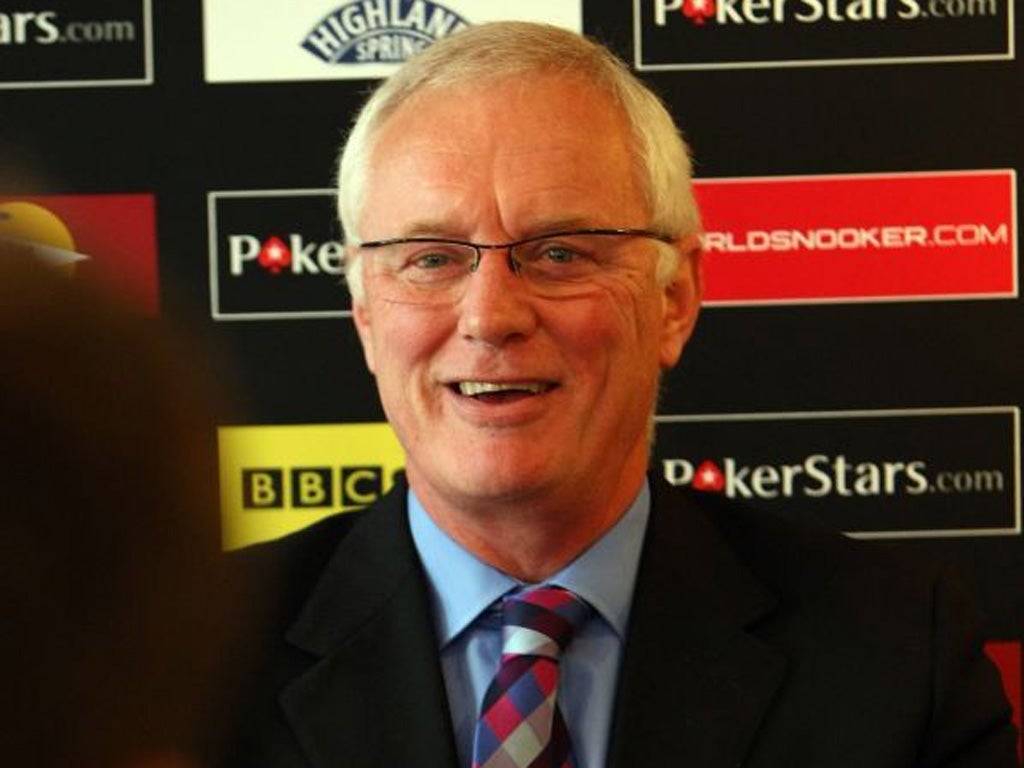The Last Word: It's 2035 and our sport stars are running Britain
At the Treasury, Kenny Dalglish and Damien Comolli teamed up on a Keynesian ticket

Who would have thought Barry Hearn would have been proved so resoundingly right? Apart from Barry Hearn of course. Here we are, let's pretend it's mid-2035, looking back to that day when the snooker soothsayer held up his sport as the example the country had to follow to haul itself out of the Great Recession of 2012.
Hearn, or Lord Leyton as he now is, said back then that snooker was making its players work harder and longer. "It's not rocket science," said Hearn, launching the 2012 world championships by outlining how his vision for snooker could be applied to government and it was not long before Government took note, or rather the Coalition spotted an escape route from the mess they were making and resigned en masse in favour of a coalition of sporting greats, or COSPOG. "This country built an empire from the playing fields of my old school," said David Cameron, "and in this time of national crisis it's time for our sportsmen and women to put down balls, rackets, real tennis rackets, hunting jackets and shotguns, and rescue England, er sorry Britain." "Blimey," said Hearn when the news reached him. "Do you know any rocket scientists?"
The first to volunteer, because that's the sort of man he is, was the ageless Sir Dave Richards, who swapped the Premier League for the Foreign Office, although not before checking there were no hidden water features waiting to trip him up in the lobby. His plan to board up the fountains in Trafalgar Square as a health and safety risk was though rejected by the new Home Secretary, Roman Abramovich. The one-time Russian took on his new role because, as he put it, "Hey, dudes, what's one more home to stay in when I've already got 413 party places" (who would have guessed that he spoke like Keanu Reeves having learnt English from watching endless re-runs of Bill and Ted's Excellent Adventure?).
The premiership went to Lord Coe, on the basis that if he could manage a budget of £53bn, the final cost of the London Olympics when all the bills were totted up, then running a country would be a breeze. Coe caused a storm by introducing compulsory sport three times a week for all adults. "See," proclaimed the PM, "I told you we would meet our promises on sporting legacy." Richards led the way by setting up weekly wrestling bouts with Michel Platini, new president of the European Union.
Coe turned to another from an athletics background to take the immigration portfolio and Charles van Commenee proved the most successful of any of his appointments. "Mr Van Commenee's open border policy has made this country great again," declared a famous editorial in the Daily Mail under the headline 'Plastic Fantastic'.
The most controversial appointments came at the Treasury, where Kenny Dalglish and Damien Comolli were teamed up again on a Keynesian ticket. Their attempts to spend their way out of recession included blowing £100m installing Andy Carroll on the fourth plinth in Trafalgar Square. "There's no defence for that," wrote Alan Hansen, editor of the Spectator.
And what of Lord Leyton? He actually never served his country, instead leading London Orient – as they became – into the Olympic Stadium and then the Champions League. Hearn oversaw Orient's aggressive takeover of West Ham and Tottenham, which at least freed Harry Redknapp to make himself available for the England job. The Football Association is expected to make a decision on who finally succeeds Fabio Capello any day now.
Staggies fuel displacement theory that's cluttering up the SPL
They will be celebrating on the terraces of Victoria Park today when Ross County play their first home game since securing promotion to the Scottish Premier League. The ascent of the Staggies – quality nickname – to the top flight is a timely good news story amid the gloom surrounding Rangers, but it holds particular appeal in this quarter because it takes the tally of top-flight clubs not named after their place of residence to over 50 per cent. County, from the small Highland town of Dingwall, join Rangers, Celtic, St Johnstone, Hearts (taking "of Midlothian" as only a vague locator), St Mirren and Hibernian. As if to labour the point, their promotion was confirmed by Queen of the South denying Dundee victory.
It is a feature of Scottish football that is rarely found south of the border. A skim through the Premier League and Football League throws up Arsenal as the only ones who are not geographised (to make up a word). There are plenty more in the lower Scottish leagues with Fife housing two of the best. East Fife play in Methil – better known for featuring in a Proclaimers number – and of course there's Raith Rovers, who have never played in Raith. My No 1 is Albion Rovers, a team so consistently bad the residents of Coatbridge fear any public link with the "Wee Rovers", which to add to their misery is a dire nickname.
Join our commenting forum
Join thought-provoking conversations, follow other Independent readers and see their replies
Comments
Bookmark popover
Removed from bookmarks